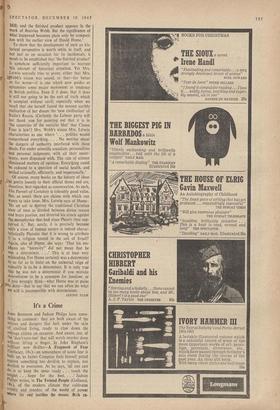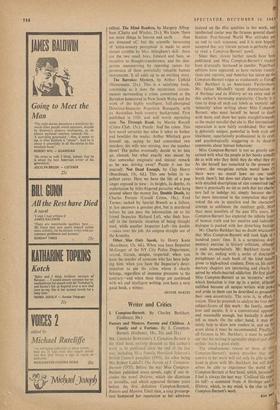It's a Crime
JOHN BINGHAM and Judson Philips have some- thing in common: they are both aware of the terrors and dangers that lurk under the skin of civilised living, ready to claw down the average citizen on occasion. And aware, too, of the 'don't-care-ism' that will watch murder done Without lifting a finger. In John Bingham's brilliant new thriller—A Fragment of Fear (Gollancz, 18s.)—an atmosphere of acute fear is built up,'as James Compton feels himself pitted against something too devilish to explain, too devilish to overcome. As he says, 'all one can do is to keep the spear ready . . . touch the amulet . . . hope for the best. . . .' Judson Philips writes, in The Twisted People (Gollancz, 18s.), of the modern climate that cultivates cruelty and murder; of the world of power : Where the end justifies the means. Both ex-
cellent. The Mind Readers, by Margery Alling- ham (Chatto and Windus, 21s.). We know 'there are more things in heaven and earth . . . than are dreamed of,' but the scientific harnessing of 'extra-sensory perception' is made to seem almost credible by Miss Allingham's skill. there are the two small boys, Edward and Sam, so receptive to thought-transference, and the dan- gerous manoeuvring by opposing camps for possession of these potentially valuable human instruments. It all adds up to an exciting story.
The Barrakce Mystery, by Arthur Upfield (Heinemann, 21s.). This is a satisfying book, combining as it does the mysterious circum- stances surrounding a crime committed at the Barrakee homestead in New South Wales and the work of the highly intelligent, half-aboriginal Detective-Inspector Napoleon Bonaparte, with an Australian bush country background. First published in 1929, and well worth reprinting now. No Through Road, by Martin Russell (Crime Club, 15s.). Puzzle : find" the crime. This first novel certainly has what it takes to bother and bewilder the reader.. Arthur Whitlock gave himself up, saying he had committed two murders; .his wife was missing, was she number three? The police eventually decide to let him go, cleared, but what exactly was meant by that somewhat enigmatic and sinister remark as he was driving away? Puzzle it out for yourself. Not Dead Enough, by Clay Henry (Boardman, 13s. 6d.). This one belies its re- pellent cover. Here we have the life of a pop singer exposed to view: its heights, its depths, its exploitation by itchy-fingered parasites who hang around where the money lies. Double Death, by Charles Forsyte (Cassell Crime, 18s.). Fred Turner,, sacked by Special Branch as a failure, at last uncovers a genuine plot, but is murdered before he can pass the information on to his friend Inspector Richard Left, who finds him- self in the fantastic situation of being thought mad, while another Inspector Left—his double —takes over his job. An enigma straight out of the Kremlin.
Other Sins Only Speak, by Henry Kane (Boardman, 13s. 6d.). When you have Inspector McGregor of the NY City Police Department, retired, literate, unique, respected; when you have the murder of someone who has been help- ing him; when you have the Inspector's deter- mination to pin the crime where it clearly belongs, regardless of immense pressures to the contrary—and when these things are combined with wit and intelligent writing, you have a very good book, a winner.
NESTER MAKEIG







































 Previous page
Previous page